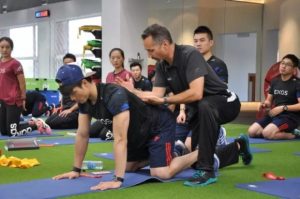
Last month, we debuted the first of several monthly installments that showcase our Functional Movement Techniques curriculum. Blades, Pods and Tape started it all; if there’s a tool to learn, we’ll show you the ropes. RockTape isn’t all tools and tape, however — for without movement itself, there would be no movement to enhance or correct.
This month, we take a closer look to the newest addition to the FMT family: FMT Movement Specialist. Read on for some thoughts from our very own Steven Capobiano, DC, DACRB, CCSP regarding this shiny new course!
 FMT Movement Specialist is a new addition to the RockTape curriculum. What made you decide that a course like this was needed?
FMT Movement Specialist is a new addition to the RockTape curriculum. What made you decide that a course like this was needed?
This course is intended to bridge the gap between the clinical expert (PT, DC, MD, OT, etc) and the fitness/wellness expert (trainer, coach, teacher, etc).
Our goal is to provide a network of movement-minded specialists that can better communicate with each other in order to maximize the outcomes with their respective patients, clients, and athletes.
What does the course cover?
The course is split into two days. Day 1 focuses on assessing and intervening with conscious (voluntary) movement (e.g. focus on the deep squat). Day 2 will transition to assessing and intervening with subconscious (involuntary) movement (e.g. gait and breathing).
Both days explain interaction with human movement via 3 subsystems — the Brain, the Midline, and Mechanical Influencers. Each system will be further assessed in order to provide the movement specialist with specific corrective tactics that will improve the effectiveness and efficiency of their patients’ movement patterns.
Who should attend this course?
Any movement minded therapist/trainer.
How does this course enhance or compliment other RockTape Continuing Education courses?
This course builds on the application of all concepts communicated in our core FMT curriculum.
How can the lessons learned via this course be incorporated into one’s daily practice (patients, clients, etc.)?
The lessons learned in this course will augment the therapist’s/trainer’s ability to make lasting changes to the movement patterns of their patients/clients. Most corrective strategies prescribed are based on a reductionist model of approach and typically has a short-lived outcome. This course, using a tri-system approach, can potentially augment the longevity of the systemic response to movement correction.
Looking for more? Check out the official course description, this how-to regarding course selection, or the registration page to get started on your next learning adventure!


